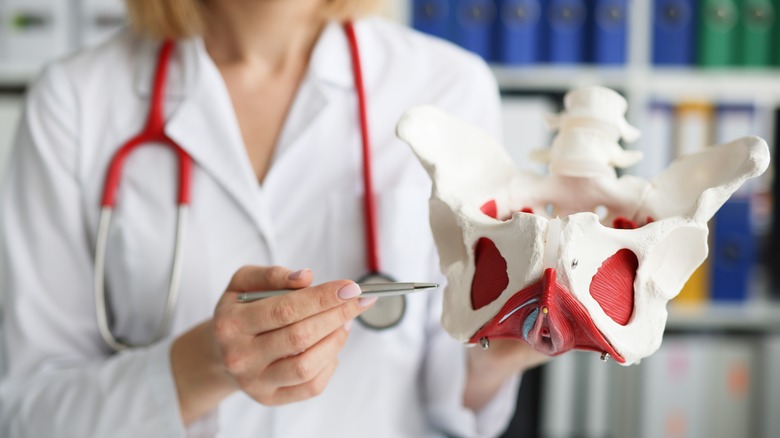Foods That Will Help You Keep A Healthy Pelvic Floor
Have you ever wondered what muscles control your bladder or ability to (quietly) pass gas? If so, let's give a round of applause to the pelvic floor muscles. These connective tissues and muscles support specific organs like the bowels, bladder, and internal sexual organs (per Cleveland Clinic). And they also help with sexual function, points out Better Health Channel. These muscles are located at the base of the abdomen and extend from the pubic bone to the tailbone, shares Cleveland Clinic.
While pelvic floor health is often associated with women because of childbirth, these muscles can be weakened by other factors. According to Better Health Channel, they can also be impaired by obesity, chronic constipation, and prostate cancer surgery. That being said, no matter what gender you are, strengthening your pelvic floor is important, and luckily there are plenty of foods that may help you keep a healthy pelvic floor.
At the top of the list of the best foods to consume for pelvic floor health are fruits and vegetables. According to the Center For Spine Care + Mobility (CSC+M), you'll want to focus on eating low-acidic fruits and vegetables. Why? Because these foods have good amounts of magnesium, which supports nerve and muscle function. Some low-acidic fruits and vegetables include bananas, beans, and potatoes. High-acidic fruits and vegetables — tomatoes, citrus fruit, etc. — should be enjoyed in moderation since these may aggravate the bladder's lining, points out CSC+M.
Key nutrients that support your pelvic floor health
Beyond focusing on low-acidic fruits and vegetables, there are many other foods that may help you keep a healthy pelvic floor. For instance, foods that can contain omega-3 fatty acids also support the pelvic floor muscles, explains CSC+M. This is because omega-3 fatty acids naturally help reduce inflammation. Some foods high in omega-3s include salmon, mackerel, sardines, oysters, herring, and anchovies (via Healthline).
While omega-3 fatty acids are most commonly associated with fish, these fatty acids can be found in various oils, seeds, and nuts too. Healthline points out that walnuts, flaxseed, chia seeds, soybeans, and cod liver oil all contain ample amounts of omega-3s.
Another key nutrient to include in your diet for pelvic floor health is vitamin D. One 2017 study reports that poor levels of vitamin D can negatively affect the function of the bladder. This is because a vitamin D receptor has been found on the detrusor wall, which is located in the bladder. The researchers explain vitamin D may play a role in muscle function, but more research is needed to confirm this.
Lastly, it's important to drink plenty of pure, non-carbonated water to help your body flush out unwanted toxins and support digestion, explains The University of Colorado Urogynecology. Water helps hydrate the body and is required by almost every system in the body to function properly. Herbal teas are another great option too; they hydrate the body as well and provide extra nutrients.

